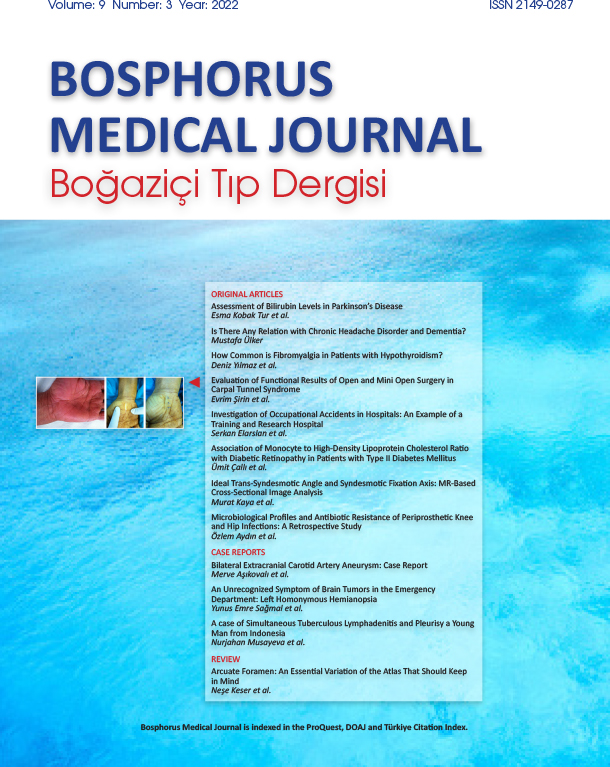Determination of the Diet Quality and Emotional Appetite of Overweight and Obese Individuals Who Consult to the Nutrition and Diet Clinic During the Pandemic Period
Deran Dalbudak Sansar, Erkan Deniz DinçerDepartment of Nutrition and Dietetics, Fatih Sultan Mehmet Training and Research Hospital, Istanbul, TürkiyeINTRODUCTION: This study was conducted to determine the diet quality and emotional appetite of overweight and obese adults aged 1865 years.
METHODS: A total of 80 overweight and obese adults who applied to a state hospital diet outpatient clinic during the pandemic period of May 2021 participated in this descriptive cross-sectional study. In the study, a questionnaire consisting of demographic information, nutritional habits, and 24-h food consumption record and emotional appetite questionnaire prepared by the researchers were used as data collection tools. Weight and height measurements were taken of the participants, whose mean age was 45.85±13.59 years, and body mass index (BMI) was calculated.
RESULTS: Of the 80 people who participated in the study, 63.7% were women and 36.3% were men. About 43.7% of the individuals were at primary school or below education level. In both groups, daily dietary intake of energy, protein, fat, carbohydrate, vitamin A, vitamin C, riboflavin, sodium, and phosphorus were higher than recommended amounts in TUBER, while potassium intake was low. There was no difference between the men and women participating in the study and in the positive or negative appetite scores of the demographic characteristics of the people. While there was no difference in positive emotions in the case of appetite during the pandemic period, a difference was observed in those whose appetite decreased in negative moods.
DISCUSSION AND CONCLUSION: As a result, it was observed that the energy, carbohydrate, fat, and protein consumption of overweight and obese individuals participating in the study were higher than recommended. This result is normal since the individuals included in the study were selected from individuals with BMI values higher than 24.9 kg/m². There was no significant difference between demographic characteristics and emotional appetites of individuals. While there was no change in positive emotions or appetite, it was observed that negative emotions affected appetite.
Pandemi Döneminde Beslenme ve Diyet Polikliniğine Başvuran Fazla Kilolu ve Obez Bireylerin Diyet Kalitelerinin ve Duygusal İştahlarının Belirlenmesi
Deran Dalbudak Sansar, Erkan Deniz DinçerFatih Sultan Mehmet Eğitim ve Araştırma Hastanesi, Beslenme ve Diyetetik Birimi, İstanbul, TürkiyeGİRİŞ ve AMAÇ: Bu çalışma, 18-65 yaş aralığındaki fazla kilolu ve obez erişkinlerin diyet kalitelerini ve duygusal iştahlarını belirlemek amacıyla yapıldı.
YÖNTEM ve GEREÇLER: Tanımlayıcı kesitsel bu çalışmaya, bir devlet hastanesi beslenme ve diyet polikliniğine 2021 yılı mayıs ayı pandemi döneminde başvuran fazla kilolu ve obez olan 80 erişkin katıldı. Araştırmada veri toplama aracı olarak araştırmacılar tarafından hazırlanan demografik bilgiler, beslenme alışkanlıkları ve 24 saatlik besin tüketim kaydından oluşan bir soru formu ve duygusal iştah anketi kullanıldı. Yaş ortalamaları 45,85±13,59 yıl olan katılımcıların ağırlık ve boy ölçümleri alınarak beden kitle indeksleri hesaplandı.
BULGULAR: Araştırmaya katılan 80 kişinin 51i (%63,7) kadın, 29u (%36,3) erkekti. Bireylerin %43,8'inin eğitim düzeyi ilköğretim ve altı idi. Her iki grupta da günlük diyetle enerji, protein, yağ, karbonhidrat, A vitamini, C vitamini, riboflavin, sodyum ve fosfor alımı Türkiye Beslenme Rehberinde önerilen miktarlardan yüksek, potasyum alımı ise düşüktü. Araştırmaya katılan kadın ve erkekler arasında ve kişilerin demografik özelliklerinin olumlu veya olumsuz iştah puanları arasında fark yoktu. Pandemi döneminde iştah durumunda olumlu duygularda farklılık olmazken, olumsuz duygu durumlarında iştahı azalanlarda farklılık gözlendi.
TARTIŞMA ve SONUÇ: Çalışmaya katılan fazla kilolu ve obez bireylerin enerji, karbonhidrat, yağ ve protein tüketimlerinin önerilenden yüksek olduğu görüldü. Çalışmaya alınan bireyler, BKİ değerleri 24,9 kg/m²den yüksek bireylerden seçildiği için bu sonuç normaldir. Kişilerin demografik özellikleri ile duygusal iştahları arasında anlamlı bir farklılık da bulunamadı. Olumlu duygularda iştahta bir değişiklik olmazken olumsuz duyguların iştahı etkilediği görüldü.
Manuscript Language: Turkish




















